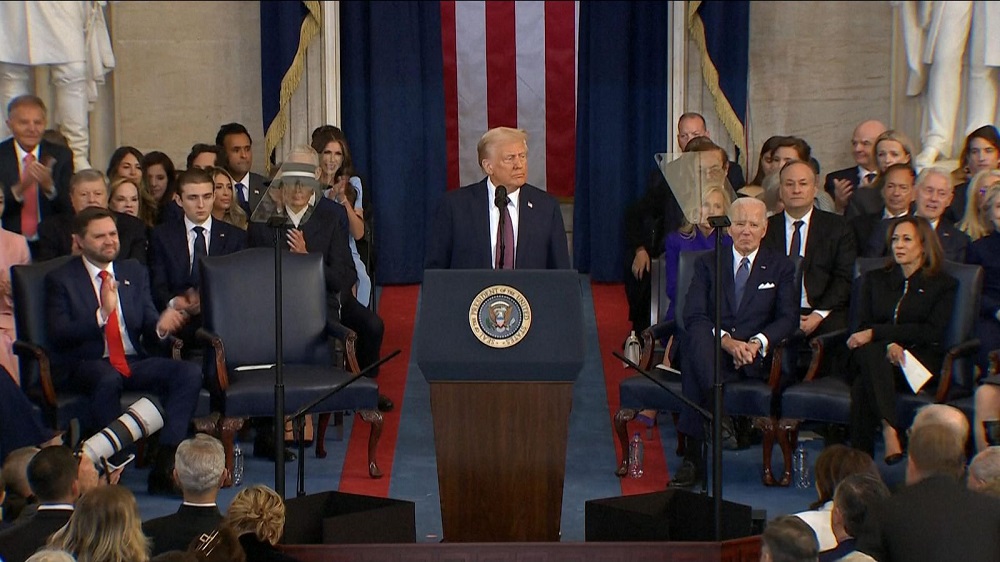News
Just in: Trump Halts Funding For Refugee Resettlement Groups

The Donald Trump administration has directed refugee resettlement groups to stop using some federal funds in light of the president’s suspension of American foreign aid, according to a U.S. State Department memo obtained by CBS News.
While refugee resettlement groups are still scrambling to interpret the scope of the funding freeze, advocates believe the move will affect their efforts to integrate refugees into communities across the United States.
John Slocum, the executive director of Refugee Council USA, a coalition of groups supporting those displaced by violence, said the Trump administration’s funding suspension would be “unfathomably cruel” if it affects reception services for refugees.
“This unprecedented decision undermines our moral and legal obligations to those we promised to protect – and to the communities who welcome them,” Slocum said. “These core services serve as a lifeline for resettled refugees and Afghan Special Immigrant Visa holders who assisted the U.S. mission.”
Hours after taking office, Trump enacted an indefinite pause on admissions of refugees, who are identified as people fleeing war and violence overseas and who undergo a years-long vetting process before being admitted into the U.S. legally. It will not be restarted until the president determines resuming refugee arrivals is “in the interests of the United States.”
Those who help refugees said the funding pause order could hinder their ability to provide critical assistance to refugees already in the U.S., including Afghans who aided the American war effort in Afghanistan.
Refugee advocates fear the directive could affect funds resettlement agencies use to help refugees during their first 90 days in the U.S. as part of a government-overseen reception program. That assistance includes casework, childcare, food and housing aid and other key social services designed to place refugees on a path to self-sufficiency in the U.S.
In a notice on Friday, resettlement agencies, many of which are faith-based groups, were told some of their federal funding awards were “immediately suspended.”
“Effectively immediately upon receipt of this Notice of Suspension the Recipient must stop all work under the award(s) and not incur any new costs after the effective date cited above,” the memo to resettlement agencies says. “The Recipient must cancel as many outstanding obligations as possible.”
It’s unclear how much money overall is being frozen by the Trump administration.
The State Department did not immediately respond to questions about the funding pause, including whether it affects funding for refugees already allowed into the U.S., as well as Afghans who assisted American military efforts and were awarded Special Immigrant Visas.
While every nationality is banned from coming to the U.S. as refugees under Mr. Trump’s edict, the administration is still allowing Afghans with these special visas to enter the country.
News
Newly-Wed, Others Rendered Homeless As Windstorm Destroys 300 Houses In Katsina

No fewer than 300 houses were destroyed, and properties worth millions of Naira were lost following a heavy windstorm and downpour in some communities in Katsina State.
The incident, which lasted for about fifteen minutes on Wednesday evening after Asr prayers, saw roofs and rafters flying through the sky.
Among the areas affected are Sabuwar Unguwar Modoji Gabas, Shinkafi, and Kukar-Gesa areas as well as Ambassador Quarters and some parts of Jibia Local Government Area (LGA) among others.
Residents Seek Help
Many residents, including a newlywed couple, were rendered homeless following the havoc.
Some of the victims described the incident as a test from God. They, however, asked the Katsina State Government and others to assist them amidst the lingering economic hardship.
Maryam Muhammad
One of the victims, Maryam Muhammad, said, “During the incident, I was just sitting inside the room and I eventually noticed that the only room I had was completely down, resulting in dislocation of my leg and hand bone.”
“Thank God all my children were at Islamiyya school then. We seek Divine and government interventions because I struggled hard and used all my property to raise this destroyed single room,” she said.
Another victim, Mubarak Rabi’u, re-echoed a similar sentiment, calling on the government to come to their aid.
“We are calling on our good government to look into our critical condition to assist us,” he said.
“Although we received this destiny in good faith, as I am speaking, we don’t know where our families will be heading, now that we are living from hand to mouth.”
Ward Head, Sabuwar Unguwar Modoji Area, Aminu Jafaru.
In the meantime, the Ward Head of Sabuwar Unguwar Modoji Gabas, Aminu Jafaru, has urged the Katsina State Government and the State Emergency Management Agency (SEMA) to as a matter of urgency send delegation to assess the level of damage in the area with a view to assist the victims.
“It was a heavy windstorm accompanied by rain which within fifteen minutes, several Houses completely destroyed. We are calling on government and well to do individuals to please come to our aid in this community otherwise many house occupants will become homeless.
“We are indeed in dire need of your kind support, please. We want the state Governor, Malam Dikko Umaru Radda, if he comes across this request, to please send a delegation to assess the level of damage here in our community,” Jafaru added.
News
BREAKING: PDP, NNPP Rep members abandon parties, lace boots with APC

Three opposition members of the House of Representatives on Thursday formally announced their defection to the ruling All Progressives Congress (APC) during plenary.
The Reps include Oluwole Oke from Osun State, who left the Peoples Democratic Party (PDP), and Kabiru Hassan Rumrum and Sani Abdullahi, both from Kano State, who defected from the New Nigeria Peoples Party (NNPP) to the APC.
Rumrum had earlier declared his resignation from the NNPP and his return to the APC during a meeting with the party’s National Chairman, Dr. Abdullahi Umar Ganduje.
Also, Oke had earlier announced his departure from the PDP in Osun State and his decision to join the APC.
Their defections were formally announced by Speaker Abbas Tajudeen at Thursday’s plenary, increasing the total number of lawmakers who have switched parties since the inauguration of the 10th National Assembly to 30.
Of the 30 defectors, 27 have joined the APC from the PDP, Labour Party, African Democratic Congress (ADC), and the NNPP.
News
FG to Seal Ijora-Marine Bridge for 21 Days Over Urgent Repairs

By Kayode Sanni-Arewa
The Federal Government has announced the temporary closure of the Ijora-Marine Bridge in Lagos for 21 days beginning Sunday, May 18, to allow for urgent repair works.
The Federal Controller of Works in Lagos, Mrs. Olukorede Kesha, disclosed this in a statement on Tuesday, noting that the closure will commence at 7:00 a.m. on Sunday.
According to the statement, sections of the bridge will be completely shut down, while others will experience partial closures throughout the repair period.
The maintenance works will include lifting the bridge deck to replace worn-out bearings, alongside other critical structural repairs,” Kesha said.
She explained that the repair project is aimed at ensuring the safety and comfort of both motorists and pedestrians who rely on the bridge.
“We understand the inconvenience this may cause, but this is a necessary step to keep the bridge in good condition and ensure the safety of all road users,” she said.
Kesha assured that traffic diversions had been carefully planned, with traffic officers deployed to manage flow and provide guidance to motorists.
She urged commuters, residents, and businesses in the area to adjust their schedules accordingly and cooperate with authorities during the repair period.
“Safety signs and traffic management tools will be put in place to minimize disruption. We sincerely apologise for the inconvenience and thank the public for their patience,” she added.
-

 News12 hours ago
News12 hours agoTinubu Endorses Establishment of Forest Guards to Counter Terrorism, Banditry
-

 News12 hours ago
News12 hours agoFG launches smart police station in Abuja
-

 News12 hours ago
News12 hours agoNNPCL failed to remit N500bn revenue in 2024 – World Bank
-

 Opinion5 hours ago
Opinion5 hours agoHuman Capital Devt: The Rep Paul Nnamchi
-

 Education23 hours ago
Education23 hours agoJust in: JAMB orders UTME resit for 387,000 candidates
-

 News5 hours ago
News5 hours agoNnamdi Kanu’s family wants court to ban NAN coverage of son’s trial or allow live streaming
-

 News1 hour ago
News1 hour agoBREAKING: PDP, NNPP Rep members abandon parties, lace boots with APC
-

 News5 hours ago
News5 hours agoSEE Current Black Market Dollar (USD) To Naira (NGN) Exchange Rate

















